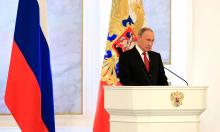Pentagon decides to keep military presence in Europe because of Russia’s power
The USA decided not to cut its military presence in Europe, Austria’s Die Presse wrote yesterday. U.S. troops were heavily deployed in the Old World during the opposition between the United States and the Soviet Union. When the Cold War ended, the Pentagon started to evacuate the troops from Europe. The U.S. administration planned to keep the deployment of only 24,000 servicemen by the end of 2008 as opposed to 43,000 military men currently serving in Europe.

However, Washington apparently changed its mind against the background of Russia’s rising powers. General David McKiernan said that the U.S. troops would stay on their European bases, because the Russian power started rising, the Austrian newspaper wrote.
“If this is a reaction to Russia’s decision to suspend its participation in the Conventional Armed Forces in Europe Treaty then it is a weak and a nonsensical statement to make. It reminds a person in a state of hysterics, not knowing what to say and how to react to something. The U.S. administration basically ignored our suggestions regarding the missile defense system. Now they start to rattle their weapons near our borders again. What’s next – another Cold War? This is a matter of the past, and no one wants to go back there again,” the Vice President of Russia’s Military Expert Board said in an interview with the Komsomolskaya Pravda newspaper.
The USA has about 730 military installations all over the world outside its territory controlled by the Pentagon. The US has nearly 1.4 million active personnel, and over 369,000 of those are deployed outside the United States and its territories.
In the meantime, The Party of European Left (EL) opposed the extension of the missile defense and U.S. military bases in Europe, EL's newly elected chairman Lothar Bisky said at the close of the EL three-day congress in Prague on Saturday.
"Europe needs neither an anti-missile shield nor an armament agency. This would only provoke further armament. Europe needs culture of peace," said Bisky, viewed as a politician who unified two left-wing parties in Germany, with voter preferences of up to 30 percent in some of the East German regions.
His speech came as an reaction to Prague and Warsaw's ongoing negotiations with Washington about the possible building of a U.S. radar installation and a base with interceptor missiles on Czech and Polish soil, respectively, Xinhua.net reports.
The EL was established in Rome in 2004. It associated 29 European left-wing and communist parties from Austria, Belgium, the Czech Republic, Estonia, Greece, Hungary, Luxembourg, Portugal, Romania, Spain, Switzerland and other countries, most of which stand to the left of social democrats on the political scene.
Source: agencies
Subscribe to Pravda.Ru Telegram channel, Facebook, RSS!





